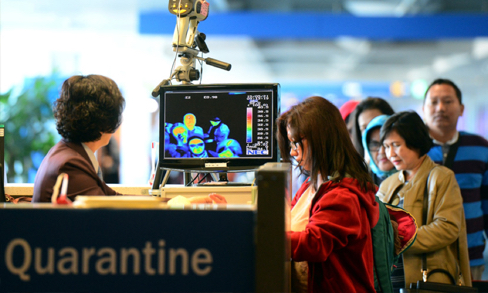
A veteran lawmaker has urged the Department of Education (DepEd) to implement stringent screening measures in air and sea ports after over 1,300 people in South Korea were put in quarantine for being sick with Middle East Respiratory Syndrome (MERS).
Valenzuela City Congressman Win Gatchalian explained such will stop MERS from entering the country, saying: “The DOH should be on top of this emergency situation. We can’t allow MERS to enter our gates so as to protect our citizens from this very infectious disease.”
The Valenzuela City representative also noted that the DOH should learn from their poor screening of passengers last year against the spread of the deadly Ebola, which has claimed the lives of more than 4,000 people globally, majority of whom are from West Africa.
Related News: Gatchalian files Human Trafficking Preventive Education Program Act
Gatchalian recalled that at the height of the Ebola scare last year, the DOH only made passengers fill out a small, colored yellow one-page questionnaire regarding how they feel and if they have symptoms.
Airport screeners did not even wear protective equipment and did not have a temperature-measuring device. There was even a notable absence of medical professionals in the receiving area. Changes in protocol were only implemented later, according to Gatchalian.
“This time, the DOH cannot be lax in doing their job. After all, it is their responsibility to look after the health of their ‘bosses’. There is no excuse in not doing their duty to the public. Imagine what would happen if an outbreak affects workers and professionals; it would ultimately disrupt the economy,” Gatchalian said.
As of 2013, statistics of South Korea’s Ministry of Foreign Affairs and Trade recorded the number of Koreans in the Philippines at 88,102 people, with Metro Manila area having the largest Korean population in the country with 33,267 people. The areas of highest concentration are Quezon City (6,655), Manila proper (6,104), and Makati (5,643).
The majority of Korean tourists in the Philippines are students who study in short-term courses in English language schools to cope with South Korea’s growing demand for English proficiency. As of March 2011, 26,823 Korean students held special study permits to enroll in short-term courses. According to the Philippine-Korean Cultural Center in Seoul, over 1,500 Koreans under 20 years old arrive in the Philippines every month to study English.
Other News: Will Gatchalian’s ‘Internet Café Regulation Act’ ban DotA, PC games?
“The large numbers of South Koreans coming to the Philippines as tourists and as students should be reason enough for the government to adapt stringent measures to prevent MERS from infecting our people,” said Gatchalian.
Information from the South Korean government showed that a doctor infected with MERS had come into contact with over 1,000 people. The doctor have participated in large-scale meetings while being infected.
Four people have already died from the disease as hundreds of schools close while around 7,000 tourists, mostly from China and Taiwan, have cancelled travel plans.
The South Korean military is also grappling with the disease, as more than 20 symptomatic soldiers have been quarantined. The number includes six who were in contact with a South Korean air force officer recently diagnosed with MERS.
“The sooner preventive measures can be done, the sooner the public’s anxiety will be quelled,” said Gatchalian.
“A calm atmosphere will not only prevent panic among the public, it will also allow concerned government agencies to strategize and allocate resources where they are needed the most,” added Gatchalian.
The Philippine Embassy in Seoul has already issued an advisory for Filipinos staying in South Korea as part of the government’s precautionary measures. (Monica Cantilero)


